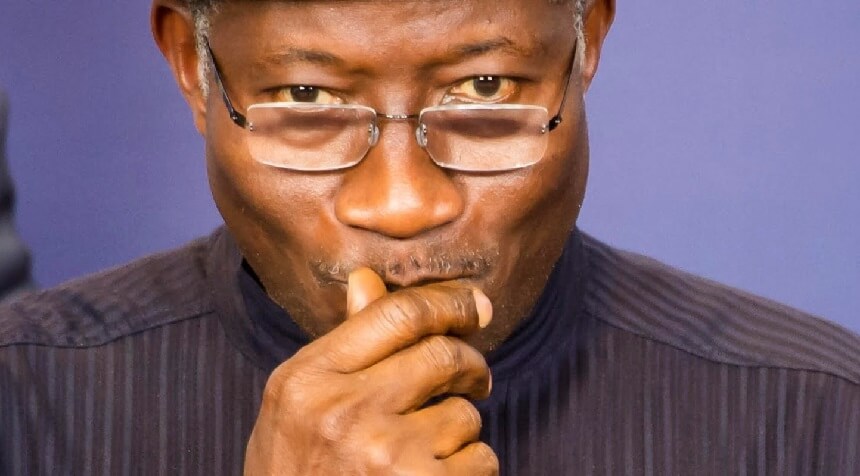In August 2011, Reuben Abati, Jonathan’s Special Adviser on media and publicity stated that Jonathan had approved the recommendation of the National Judicial Council (NJC) to suspend Justice Ayo Salami from office over his refusal to apologize to the outgoing Chief Justice of Nigeria, Aloysius Katsina-Alu and the NJC, as recommended by a committee headed by the chief judge of Nigeria, Ibrahim Auta.
The statement reads in part : “President Goodluck Ebele Jonathan is in receipt of a correspondence dated 18th August, 2011, from the National Judicial Council (NJC), recommending the compulsory retirement of Hon. Justice Isa Ayo Salami, OFR, for misconduct in accordance with the provisions of Section 292 (1) (a) (i) of the 1999 Constitution of the Federal Republic of Nigeria, as amended, and Rule 1 (1) of the Code of Conduct for Judicial Officers of the Federal Republic of Nigeria.”
Advertisement
Thus, the National Judicial Council suspended Salami on August 25, 2011.
The suspension of salami also generated some controversies with many reading political meanings into it.
A week after, the National Chairman of the Conference of Nigeria Political Parties, Alhaji Balarabe Musa, described Salami’s suspension as an attempt by Jonathan to defeat justice in the presidential election petition tribunal.
He alleged that Salami’s suspension had given credibility to speculations that Jonathan would interfere with the decision of the presidential election petition tribunal, claiming that Salami was suspended to pave the way for manipulation at the tribunal.
Advertisement
“What has happened has further given credibility to our speculations, the judiciary is once more being used as tool by the executive arm of government,” he said.
The suspension of salami did not end there as the acting President of the Court of Appeal, Justice Dalhatu Adamu, also redeployed a member of the Presidential Election Tribunal, Justice Mohammed Garba, possibly setting the stage for the reconstitution of the panel.
Mohammed Garba was replaced with justice Zainab Bulkachuwa from the Yola Division of the court of Appeal, because, Garba, who is believed to be a close ally of the suspended President of the court, Justice Ayo Salami, it was learnt, was transferred to the Calabar Division of the court.
It did not end there as another justice who is also an associate of Salami, Justice Paul Galinje, was also transferred from the Abuja Division of the court to the Port Harcourt Division.
Until his transfer last week, Garba was the presiding justice of the Abuja Division of the Court of Appeal.
Advertisement
Monday, August 29, 2011, Garba had presided over the hearing of the petition filed by the Congress for Progressive Change, CPC challenging the declaration of Dr. Goodluck Jonathan as the winner of the April presidential election.
Salami’s suspension had reduced the panel membership from five to four. Prior to his suspension, Salami chaired the presidential election petition tribunal.
The tribunal, which began sitting in May 2011, had six months under the law to conclude hearing of the petition on the presidential election.
The redeployment of the two justices came in the wake of movement of some registrars of the court.
Prior to the redeployment of Garba and Galinje, Dalhatu Adamu was said to be under pressure to reconstitute the presidential election petition tribunal and shake up the Court of Appeal.
It was learnt that Adamu was being pressured to reconstitute the presidential election petition tribunal; a move which some lawyers and politicians said would send the dangerous signal to the public.
Advertisement
While acknowledging that Adamu has the constitutional powers to redeploy any justice of the Court of Appeal, a legal expert explained that his action could be misinterpreted given the circumstances under which he came into office.
But one of the counsels in the petition before the tribunal said: “If the panel is reconstituted, none of the parties will lose anything because we have not reached the hearing stage.
“We are still at the preliminary stage which can be handled by any judge. Once a petition is at the hearing stage, you cannot change the judges.
“But I don’t think outright disbandment will be okay because once such a step is taken, petitioners will start to read meanings into it. To me, there is nothing in the petition of the CPC; the panel should be allowed to remain or else, we will end up with a well-deserved judgment being beclouded by political sentiments.”
The CPC had alleged after Salami’s suspension that his removal was aimed at frustrating its petition.
The party, in a statement in Abuja by its National Publicity Secretary, Engr. Rotimi Fashakin, had queried what it described as “the hush-hush manner” in which President Goodluck Jonathan approved the NJC’s recommendation for the suspension of the former President of the Court of Appeal.



